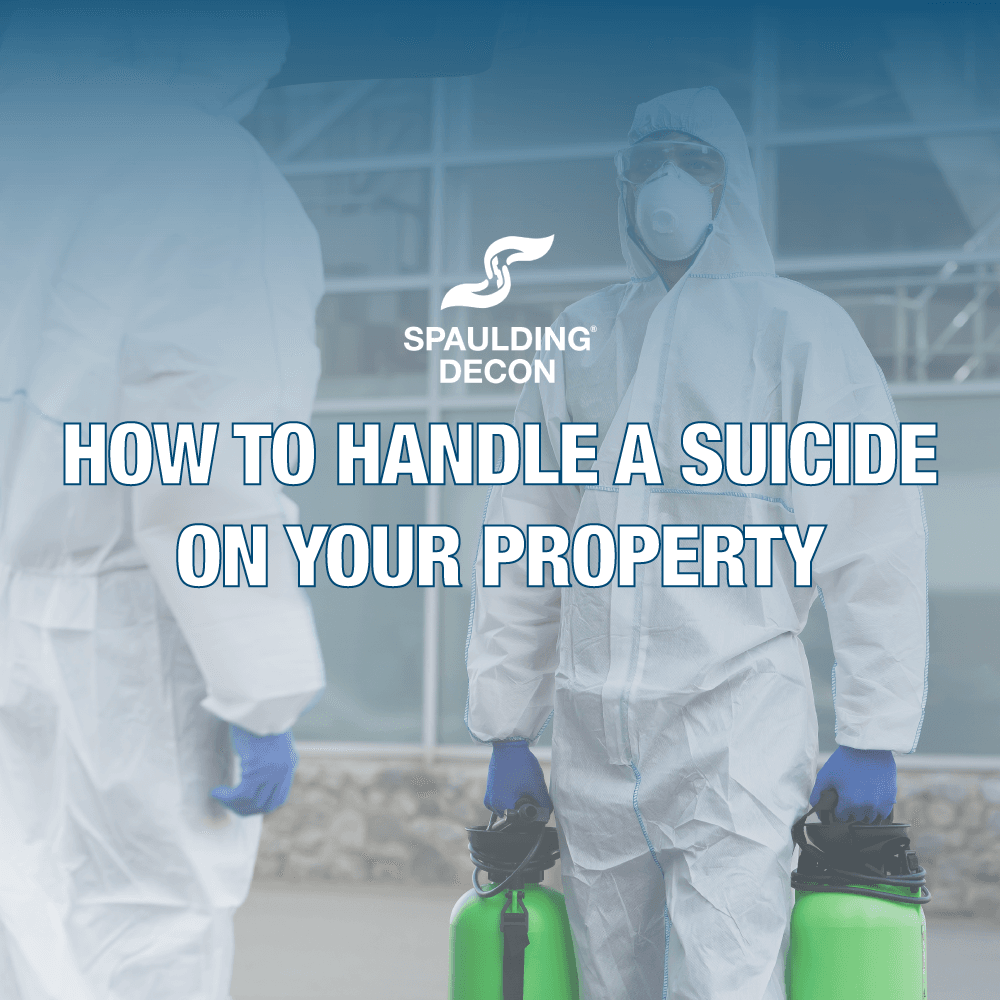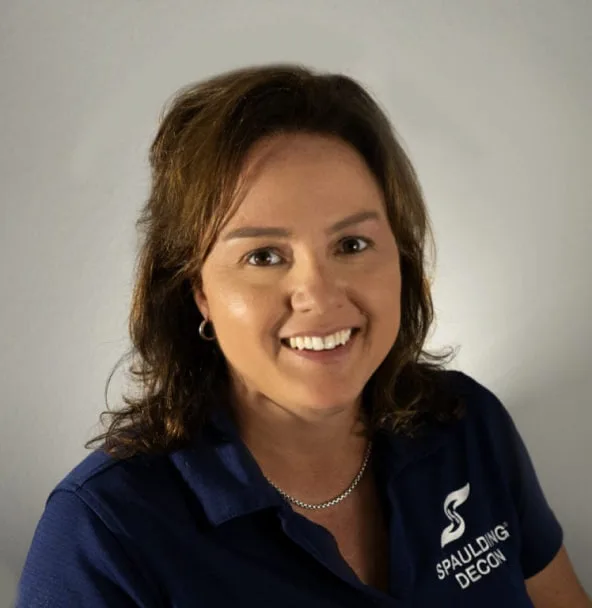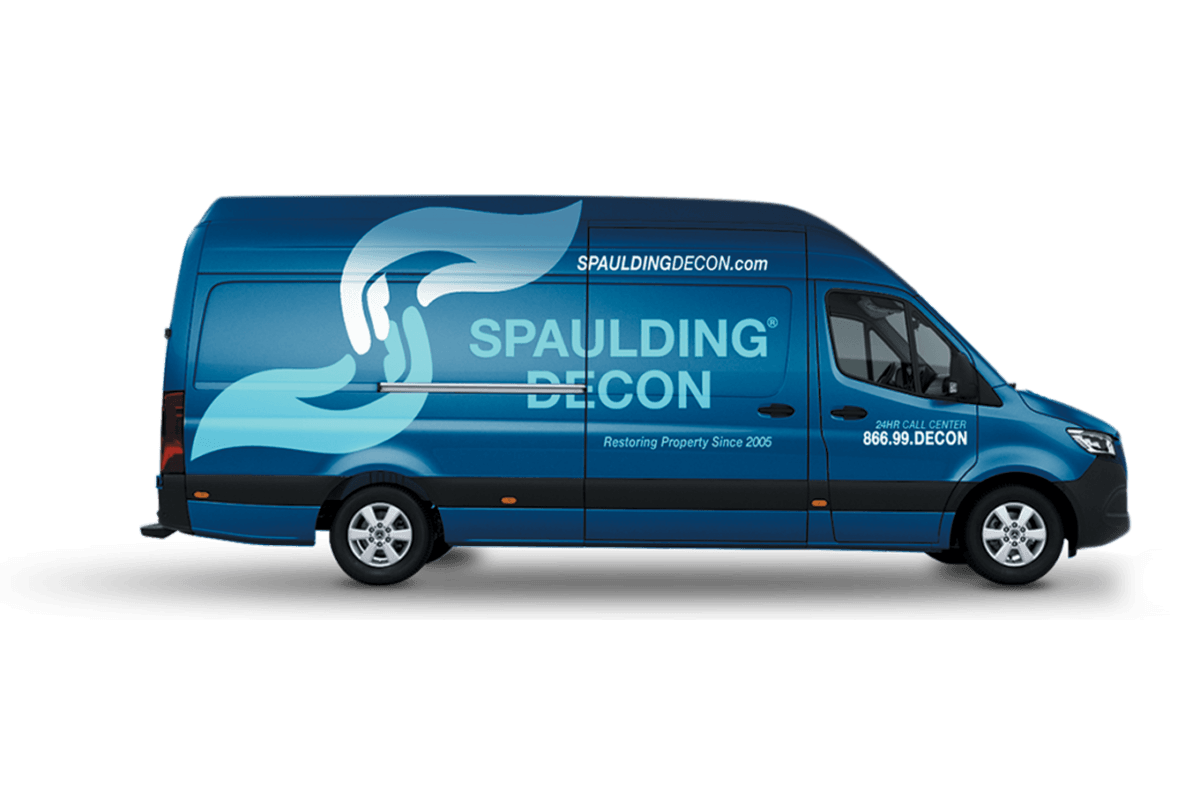Coming into the scene of a suicide can be quite traumatic for anyone, especially family members of the deceased.
If you want to learn more about how suicide impacts families emotionally, socially, and financially, read our guide on how suicide affects families.
If someone commits suicide on your property or another location, you will need to clean up the biohazard or remains as law enforcement does not do this. First you will need to call law enforcement to perform a thorough investigation. Once this is complete you should consider hiring biohazard experts as cleaning remains is an extensive job. This requires having safety protective gear, the right chemicals and equipment to clean thoroughly and experts to dispose of decomposition as you cannot just dump it in the trash.
Once this is done you will need to decontaminate all items used during cleaning. Hiring experts, such as Spaulding Decon is the best course of action as they handle the entire process for you so that you can grieve peacefully and without additional stress.
If you need to handle a clean up yourself, please visit https://www.gov.mb.ca/health/publichealth/factsheets/pep_book.pdf for additional safety guidelines.
What is a biohazard or suicide cleanup?
Biohazard or suicide cleanup, is the act of having to safely clean biohazardous waste.
This process requires precision, safety measures, and decontamination. Suicide cleanup is specific to cleaning the aftermath of a suicide. Biohazardous wastes can fall under certain categories: infectious, radioactive, flammable, toxic, corrosive, reactive.
Examples of biohazard waste:
- Infectious: (blood, tissues, needles, anything with body fluids).
- Radioactive: (any waste that contains radioactive waste such as Uranium and Thorium).
- Flammable: (I.e., Alcohols, ether, acetone, gasoline).
- Toxic: lead in water, chemicals from landfills, exhausts from cars.
- Corrosive: include but are not limited to Glycolic Acid, Sulfuric Acid, and Hydrogen Peroxide.
- Reactive: explosives, peroxides and really anything that has a component that could cause an explosion.
What should you do if someone has died by suicide, or if there was an unattended death in your property?
- Call the police.
- Decide whether you are going to hire an expert to do the cleanup.
- If you are going to do the cleanup yourself, make sure you have protective gear and cleaning agents specific for cleaning biohazard (see examples above). Ensure you have the proper disposal bags for biohazard and make sure you label and dispose accordingly (contact your local waste company). For more information visit https://www.vumc.org/safety/waste/biological-waste-guide
- Once you have completed your cleanup make sure you decontaminate the supplies you used for the cleanup. If you used a broom, mop, towels, anything that may have come into contact with the biohazardous material, needs to be decontaminated.
- If you encounter biohazardous material, seek medical attention right away.
- Seek help if you become depressed or struggle with grief due to suicide. The Suicide Prevention Hotline has resources that can help. Visit https://suicidepreventionlifeline.org/help-yourself/loss-survivors
Do I have to report a suicide or unattended death?
Make sure you contact the authorities as they will want to do a thorough investigation to rule out foul play. Authorities will show up to the scene and let you know when and if you are able to enter the scene but only upon receiving instruction to do so.
Additionally, you will want to Inform the victims family as they may have pertinent information and might be able to shed some light on the situation for authorities or provide additional information.
Should you hire someone to do the work for you?
There are experts trained in removing biohazardous waste. They will handle everything for you. Whether it be carpet removal, cleaning, tile removal, disposal, odor elimination, and even insurance claims. Visit spauldingdecon.com and our Biohazard Cleaning page to learn more about our services. The benefit of hiring experts is that you will not have to worry about encountering biohazard material, as it can be dangerous and detrimental to your health.
Do homeowners insurance policies cover suicide cleaning?
Most homeowners insurance policies will cover the costs of cleaning and decontaminating biohazard that resulted from a suicide in that property. Companies like Spaulding Decon will handle the claims for you so that you can grieve peacefully.
What is the cost for biohazard cleanup?
Biohazard cleaning costs vary depending on the severity of the cleanup. In some cases, cleaners will have to remove tile, carpets, or sheet rock, and this would cost more than just a plain cleanup without biohazard that has seeped through the surfaces.
Some scenes contain less blood than others and this keeps costs lower. Keep in mind that most homeowners insurance policies cover the cost of suicide cleanup, which is why it is smart to contact a professional such as Spaulding Decon to the leg work for you.
Are there suicide cleaning guidelines I can follow?
Yes, visit https://www.gov.mb.ca/health/publichealth/factsheets/pep_book.pdf for more in-depth information.
If you find yourself in a position where someone has died by suicide and you are left to clean it, you will be coming into direct contact with biohazard. Bodily fluids such as blood and all other organ tissues are considered biohazard and can be dangerous as there are many infectious diseases that are transmittable by blood.
The cleaning process is extensive and grueling as you may find yourself having to remove carpets, tile, or even dry wall. You need to make sure you protect yourself with protective gear, have the correct biohazard cleaning materials and chemicals, have bio waste bags that do not leak, and dispose of them in a location designated by your county.
Finally, you need to make sure you are following all biohazard waste guidelines. Therefore, we strongly recommend hiring a professional company such as Spaulding Decon, who has years of experience in cleaning biohazardous content. Spaulding Decon even files your insurance claim for you so that you do not have to deal with that aspect of the process.





